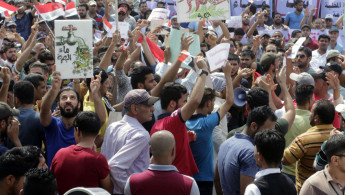Angry protests in Iraqi cities at corruption, power cuts
Hundreds of Iraqis demonstrated Saturday in the sweltering southern cities of Basra and Karbala as protests over the poor quality of water and electricity supply spread across the country.
The protests came a day after almost 2,000 people gathered in central Baghdad to chants of "thieves, thieves, thieves", accusing the government of corruption and incompetence.
| "The local government is always promising improved water and electricity but they are liars and no longer have any credibility. |
In the southern oil hub of Basra, around 500 people, waving banners and Iraqi flags, protested in front of the governor's office to demand a solution to the long-running problem of salty tap water.
"We demand the dismissal of the governor and of the provincial council; the time has come for Basra's people to get their rights," said Ziyad Tareq, a 24-year-old student.
When the governor's deputy went out to hear their demands, demonstrators pelted him with plastic water bottles and insisted on seeing the governor himself.
"The local government is always promising improved water and electricity but they are liars and no longer have any credibility," Tareq said.
"The temperature is 54 degrees Celsius (129 Fahrenheit) in central Basra right now... the Basra people are very angry at their rulers."
Raad Jassim, an employee at the South Oil Co, said Basra residents were increasingly frustrated at their region's inability to capitalise on its massive oil wealth.
"Basra is feeding Iraq; it is bankrolling the country, and we do not even have water that is suitable for livestock," the 36-year-old said.
According to oil ministry figures released on Saturday, 94.9 of the 96.2 million barrels of oil exported by Iraq in July came from southern oil fields.
Yet it remains under-developed and has suffered from chronic power outages, poor water quality, uncollected waste and other problems that have led a growing number of Basrawis to call for autonomy.
'Thieves'
Security forces were out in force Saturday around the governorate, less than two weeks after violence erupted during a previous protest against electricity shortages.
| We have started this protest and will continue until services are improved. |
"There is security here as if we were staging a coup against the government. We are demonstrating peacefully and all we want is our right to drink clean water," said Mahmud Shaker, a 52-year-old high-school teacher.
The slogans were similar in the holy city of Karbala, about 75 kilometres (45 miles) south of Baghdad.
The protesters marched from the neighbourhood housing the Imam Hussein shrine, one of the holiest sites in Shia Islam, to the governor's office.
"You are stealing from us in the name of religion," chanted a crowd that included many students, artists and journalists.
"We have started this protest and will continue until services are improved, especially electricity," said Abdelhalim Yasser, a civil society activist and an organiser of the march.
"If this political class failed to improve the situation in 12 years, then they should resign, because we are running out of patience," he said.
Ali al-Shaibani, a theatre actor, called on the marjaiya (Shia religious leadership) to issue a fatwa (religious decree) to speed up change.
"The matter has gone from bad to worse and it is going to take mass popular mobilisation against those who have been stealing the Iraqis' money," he said.
"These people have high salaries, properties and electricity 24 hours a day while we remain in sweltering heat," Shaibani said.
As popular discontent and temperatures grew, Prime Minister Haider al-Abadi on Wednesday ordered state institutions and officials to save electricity with programmed power cuts.





 Follow the Middle East's top stories in English at The New Arab on Google News
Follow the Middle East's top stories in English at The New Arab on Google News
![The UAE is widely suspected of arming the RSF militia [Getty]](/sites/default/files/styles/image_330x185/public/2024-11/GettyImages-472529908.jpg?h=69f2b9d0&itok=Yauw3YTG)
![Netanyahu furiously denounced the ICC [Getty]](/sites/default/files/styles/image_330x185/public/2024-11/GettyImages-2169352575.jpg?h=199d8c1f&itok=-vRiruf5)
![Both Hamas and the Palestinian Authority welcomed the ICC arrest warrants [Getty]](/sites/default/files/styles/image_330x185/public/2024-11/GettyImages-2178351173.jpg?h=199d8c1f&itok=TV858iVg)